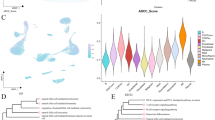Abstract
Gene expression data has in recent years demonstrated the superior capacity to predict the prognosis of breast cancer patients unreceiving adjuvant chemotherapy comparing to the information available from traditional clinical and pathological sources. Meanwhile, adjuvant chemotherapy can significantly improve survival of breast cancer. It would be inappropriate to ignore its effect on prognosis. We hypothesized that an integrated gene expression profile can predict the prognosis of breast cancer patients receiving chemotherapy. Therefore, we screened the specific gene markers and constructed an integrated 24-gene signature by low-density microarray including the “poor signature” and genes related to resistance to chemotherapy. The gene signature stratified correctly patients into good prognosis group and poor prognosis group. In addition, the Kaplan–Meier analyses for disease-free survival as a function of the 24-gene signature showed highly significant differences between the two groups (Log Rank test P < 0.0001 = Univariate and multivariate Cox’s proportional-hazards regression analyses indicated that the signature represents the strongest independent prognostic factor for breast cancer patients. When compared with single signature, such as Oncotype DX™ and 70 poor signature, the integrated signature showed more predominant power of predication in breast cancer patients receiving chemotherapy. Such integrated signature will critically aid clinical decision making at the level of individualization for most breast cancer patients receiving chemotherapy.






Similar content being viewed by others
References
Fisher B, Jeong JH, Bryant J et al (2004) Treatment of lymph-node-negative, oestrogen-receptor-positive breast cancer: long-term findings from National Surgical Adjuvant Breast and Bowel Project randomised clinical trials. Lancet 364:858–868
Early Breast Cancer Trialists’ Collaborative Group (EBCTCG) (2005) Effects of chemotherapy and hormonal therapy for early breast cancer on recurrence and 15-year survival: an overview of the randomized trials. Lancet 365:1687–1717
Van’t Veer LJ, Dai H, van de Vijver MJ et al (2002) Gene expression profiling predicts clinical outcome of breast cancer. Nature 415:530–536
Wang Y, Klijn JG, Zhang Y (2005) Gene-expression profiles to predict distant metastasis of lymph-node-negative primary breast cancer. Lancet 365:671–679
Paik S, Shak S, Tang G (2004) A multigene assay to predict recurrence of tamoxifen-treated, node-negative breast cancer. N Engl J Med 351:2817–2826
Saeki T, Tsuruo T, Sato W et al (2005) Drug resistance in chemotherapy for breast cancer. Cancer Chemother Pharmacol 56(Suppl 1):s84–s89
David J, Stacey L, Zachary Veitch et al (2006) cDNA microarray analysis of isogenic paclitaxel- and doxorubicin-resistant breast tumor cell lines reveals distinct drug-specific genetic signatures of resistance. Breast Cancer Res Treat 96:17–39
Andy JM, Gaorav PG, Peter MS et al (2005) Genes that mediate breast cancer metastasis to lung. Nature 436:518–524
Kang Y, Siegel PM, Shu W et al (2005) A multigenic program mediating breast cancer metastasis to bone. Cancer Cell 3:537–549
Li D, Hou Y, Wu J et al (2006) Gene expression profile analysis of an isogenic tumour metastasis model reveals a functional role for oncogene AF1Q in breast cancer metastasis. Eur J Cancer 42: 3274–3286
Cleator S, Tsimelzon A, Ashworth A et al (2006) Gene expression patterns for doxorubicin (Adriamycin) and cyclophosphamide (Cytoxan) (AC) response and resistance. Breast Cancer Res Treat 95:229–233
Heyer BS, Kochanowski H, Solter D (1999) Expression of Melk, a new protein kinase, during early mouse development. Dev Dyn 215:344–351
Lin M-L, Park J-H, Nishidate T et al (2007) Involvement of maternal embryonic leucine zipper kinase (MELK) in mammary carcinogenesis through interaction with Bcl-G, a pro-apoptotic member of the Bcl-2 family. Breast Cancer Res 9:R17
Pusztai L, Krishnamurti S, Perez Cardona J et al (2004) Expression of BAG-1 and BcL-2 proteins before and after neoadjuvant chemotherapy of locally advanced breast cancer. Cancer Invest 22:248–256
Tang SC, Beck J, Murphy S et al (2004) BAG-1 expression correlates with Bcl-2, p53, differentiation, estrogen and progesterone receptors in invasive breast carcinoma. Breast Cancer Res Treat 84:203–213
Acknowledgement
This research was supported in part by the grants from the National Basic Research Program of China (2006CB910501), National Natural Science Foundation of China (30371580, 30572109); Shanghai Science and Technology Committee (03J14019, 06DJ14004, 06DZ19504).
Author information
Authors and Affiliations
Corresponding author
Additional information
Lian-Fang Li and Xiaojing Xu have contributed equally to this work.
Rights and permissions
About this article
Cite this article
Li, LF., Xu, XJ., Zhao, Y. et al. Integrated gene expression profile predicts prognosis of breast cancer patients. Breast Cancer Res Treat 113, 231–237 (2009). https://doi.org/10.1007/s10549-008-9925-4
Received:
Accepted:
Published:
Issue Date:
DOI: https://doi.org/10.1007/s10549-008-9925-4




